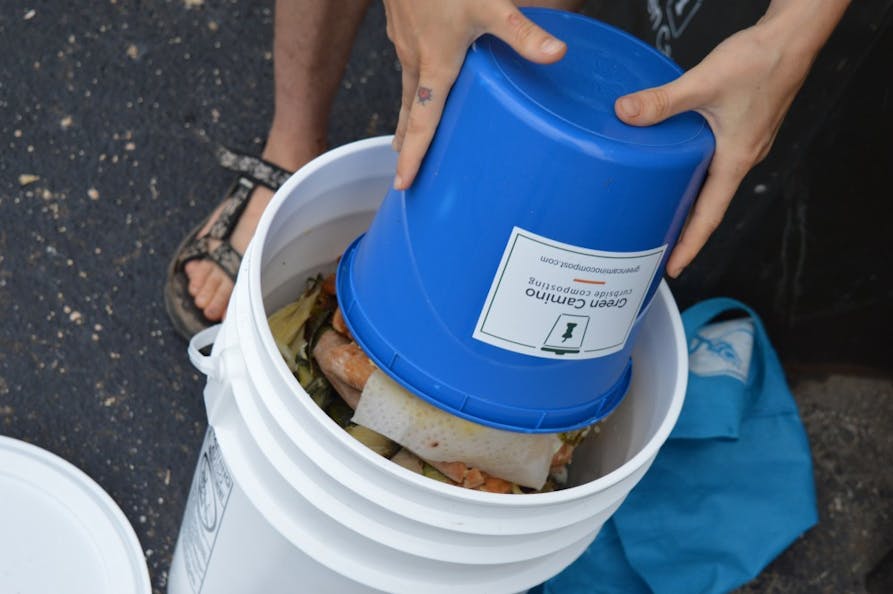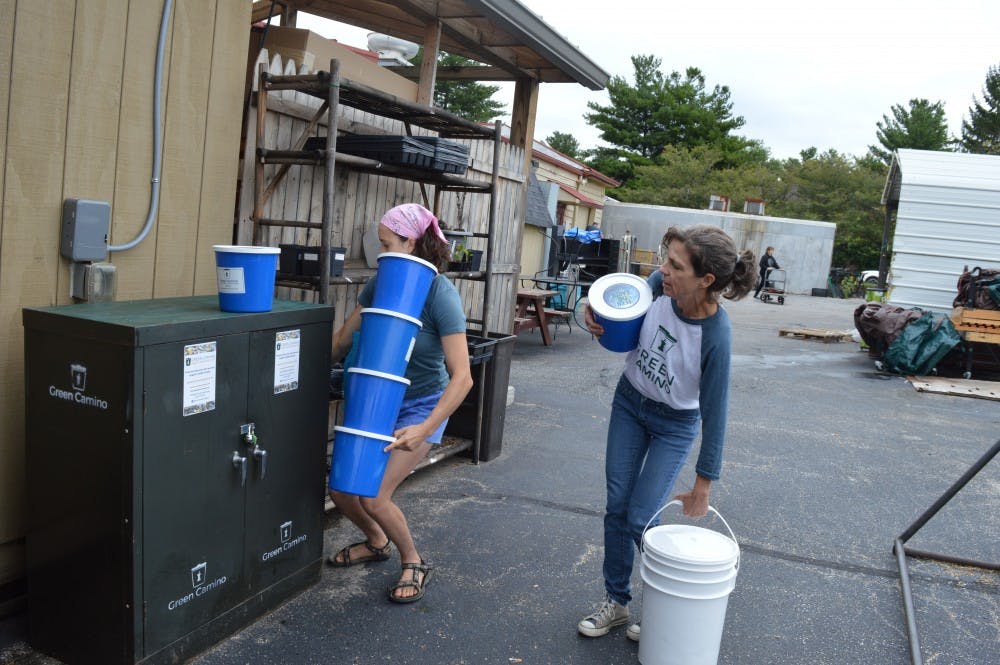Kathy Gutowsky has about 60 compost buckets stacked in the garage of her house past Memorial Stadium and a hundred more stashed in a shed. A couple hundred are stored in Randi Cox's yard.
The buckets are part of Green Camino, a curbside compost service Gutowsky and Cox created to make composting accessible.
“We simplify and make composting convenient,” Gutowsky said.
Composting helps divert waste from the landfill by converting organic waste into soil enrichment. Compostable products include food scraps, meat and dairy, coffee grounds, pizza boxes, uncoated paper carryout containers, paper napkins, cups, tissues and more. A full list can be found on Green Camino’s website.
A study solicited by the Monroe County Solid Waste Management District earlier this year classified nearly 40 percent of the county’s waste as compostable. This means food waste currently being dumped into the landfill could have been reused.
Food waste in the landfill produces methane, Gutowsky said, which is a potent greenhouse gas. And the trek from the trash to the landfill — about 60 miles from Bloomington to Terre Haute — is significantly longer than Green Camino’s six-mile journey to Fable Farms.
The City Sanitation Department only allows approved entities to pick up waste from its customers, which include single-family homes and apartment buildings with four units or fewer.
In August, Green Camino was formally authorized to pick up compost from City Sanitation Department customers on a two-year pilot. During that time, the city will evaluate whether curbside compost is something Bloomington could offer or contract out, said Autumn Salamack, assistant director of sustainability for the Economic and Sustainable Development Department.
Green Camino currently offers weekly and biweekly pickup services only to customers inside city limits, but people outside Bloomington can register for drop-off. They also offer commercial programs for businesses and events.
Upon registering, customers receive instructions and a starter kit with a 5-gallon bucket, 1-gallon kitchen pail and Green Camino yard sign. When the full bucket is picked up or dropped off, the compost is swapped for a clean container and taken to Fable Farms.

The farm mixes the waste with leaves and horse manure, which is a good source of nutrients for soil. The manure also heats up the composting process, helping kill pathogens that might be in meat waste and accelerating the breakdown process.
The farm currently uses the broken-down materials to supplement their own soil, Gutowsky said, but they plan to produce finished compost, a rich fertilizer they can sell, in 2019.
Gutowsky and Cox started investigating how to produce the composting process on a larger scale after becoming compost volunteers at Mother Hubbard’s Cupboard a couple years ago. They started a three-month pilot in November 2017.
Individuals won’t save money by composting with Green Camino. The residential services cost $20 per month for biweekly curbside pickup, $32 per month for weekly curbside and $15 per 6-pack for the drop-off.
“You’re buying into a service, but you’re buying into our mission,” Gutowsky said. “You’re buying into building the foundation of a potentially zero-waste community.”
In its Sustainability Action Plan set to be finalized this month, the city has set forth a vision to make Bloomington a zero-waste community. The goal is to divert at least 65 percent of residential waste from the landfill by 2023.
While completely eliminating the city’s waste is unlikely, Salamack said the vision focuses on recycling, composting and reusing as many materials as possible.
Part of this involves spreading the word. As a benefit corporation, Green Camino uses a portion of their profits for education and outreach. They are also required to buy products locally, but the only new items they purchase are bucket lids.
The 5-gallon buckets are reused pickle containers from local restaurants such as McAlister’s Deli, Dagwood’s Deli and Sub Shop, and Potbelly. The 1-gallon pails typically hold mushrooms at Pizza X.
New buckets are soaked in hot water and vinegar before Cox or Gutowsky scrub off stickers with an ice scraper. They hand-wash the buckets at the farm each week, hosing them out and spraying them with sanitizer.
“We dream of bucket washers,” Gutowsky said.
Since November, Green Camino has picked up almost nine tons of waste, recovered more than 700 buckets and pails and educated more than 800 people through events and outreach. They serve more than 70 customers, including City Hall. The operations are run by Gutowsky, Cox and IU student employee Maggie Gates.
Junior Hannah Blalock and three of her roommates have been talking about composting for two years, but organizing it on their own was too much work. When they heard about Green Camino at the beginning of this semester, they seized the opportunity.
“It’s really easy,” Blalock said.
Blalock and her roommates initially signed up for the biweekly pickup. Two of the four of them are vegetarians, and as students who don’t consistently cook, they figured they wouldn’t have enough composting materials to fill a bucket every week. The first two weeks proved them wrong.
“I didn’t realize we were throwing this much stuff into the landfill,” Blalock said.
They switched to the weekly pickup schedule after two weeks.




